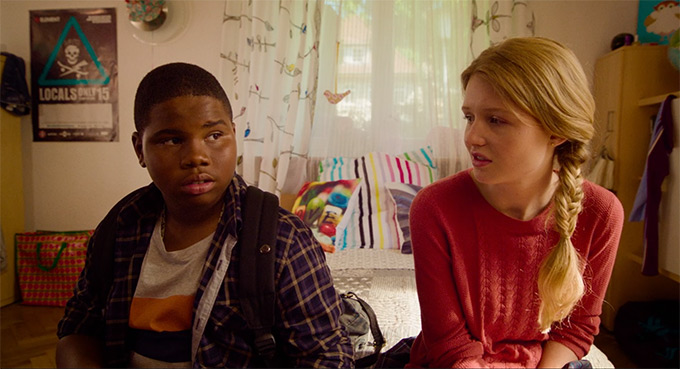More than anything, Chad Hartigan’s quirky coming of age
film “Morris From America” serves as a showcase for the immense potential of its
two main actors. That would be newcomer Markees Christmas as the titular
Morris, a Hip Hop loving thirteen-year-old who recently relocated to Germany
with his dad. Christmas is superb-- playing Morris as an awkward, timid loner
with a bit of an attitude. Christmas’s natural, assured performance indicates
that he is more than comfortable with carrying a movie.
Meanwhile Craig Robinson plays Morris’ father Curtis who’s
taken a job with a German soccer team. Known primarily through his comedic work
on the TV show “The Office,” as well as the “Hot Tube Time Machine” movies,
Robinson demonstrates here his ability to handle more dramatic roles. He gives
a poignant, sensitive performance as a recent widower trying to find the right
balance of friend and parent in regards to raising his son.
As for the movie itself, “Morris” is a pleasing yet slight coming
of age tale. Enjoyable enough in the moment but doesn’t give you a lot to chew
on afterwards. There’s not much as far as plot’s concerned—it’s simply about
young Morris trying to adjust to his new surroundings and make friends over the
course of the summer while also dealing with new found feelings of love. Morris
develops a crush on Katrin (Lina Keller) an intelligent, charming rebellious
fifteen-year-old who brings him out of his timid shell by taking him to parties
and feeding him ecstasy and marijuana joints. They have some amusing and
heartfelt moments together but the relationship develops the way you expect it
to with a predictably bittersweet resolution. In fact overall Hartigan’s
screenplay yields little in the way of surprises.
However, the fact that Morris and Curtis are black and
seemingly the only black people in the city they live adds an additional
intriguing layer of alienation to the picture. Moving to a new place where you
don’t know anyone is hard enough but to move to a new place where there’s
nobody else who even looks like you would be an even bigger challenge. Hartigan
deals with this issue of unfamiliarity and otherness in a subtle way. Morris is
never seriously harassed but you can detect mild racism in some of his
interactions with other German teens. After all, these kids probably haven’t
encountered many African Americans (if any) and as such they only have
stereotypes to go off of: black people are good dancers, black people are good
at basketball etc. Additionally, Morris
is continually called “Kobe” by a German boy and frequently referred to as the
“black boy” by both adults and kids.
Although, I do wish the film had given Robinson more to do.
I wanted to learn more about his character and life outside of simply being
Morris’s father (we only catch a few brief glimpses). What about his own
struggles with being one of the only African Americans in town and in his
profession?
Overall, “Morris From America” is never bad or even
dislikable. It’s well made and well acted, though its impact is admittedly
minor.
B

No comments:
Post a Comment